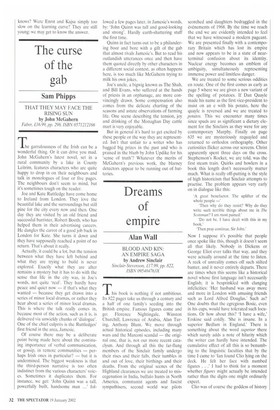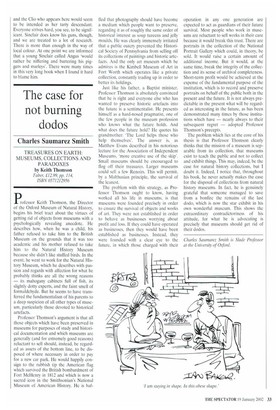Dreams of empire
Alan Wall
BLOOD AND KIN: AN EMPIRE SAGA by Andrew Sinclair Sinclair-Stevenson, £17.99, pp. 822, ISBN 095404763X This book is nothing if not ambitious. Its 822 pages take us through a century and a half of one family's seeding into the British empire. Famous figures come and
go: Florence Nightingale, Winston Churchill, Lawrence of Arabia, Alan Turing, Anthony Blunt. We move through actual historical episodes, including many wars and the Marconi scandal — the original one, that is, not our more recent cataclysm. And through all this the far-flung members of the Sinclair family undergo their rises and their falls, their tumbles in and out of love, their birthings and their deaths. From the original scenes of the Highland clearances we are treated to miscegenation in India, buffalo hunts in North America, communist agents and fascist sympathisers, second world war pilots scorched and daughters bedraggled in the evenements of 1968. By the time we reach the end we are evidently intended to feel that we have witnessed a modern pageant. We are presented finally with a contemporary Britain which has lost its empire and now appears to be in a state of nearterminal confusion about its identity. Nuclear energy becomes an emblem of ambiguity, simultaneously representing immense power and limitless danger.
We are treated to some serious oddities en route. One of the first comes as early as page 5 where we are given a new variant of the spelling of potatoes. If Dan Quayle made his name as the first vice-president to insist on an e with his potato, here the quayle is reversed and we are treated to potatos. This we encounter many times since spuds are as significant a dietary element for the Sinclairs as they were for any contemporary Murphy. Finally on page 635 we are mysteriously requayled and returned to orthodox orthography. Other curiosities flicker across our screens. Christ apparently spent three days on the cross. Stephenson's Rocket, we are told, was the first steam train. Quirks and howlers in a book this length don't necessarily matter much. What is really off-putting is the style of high historicism that Sinclair attempts to practise. The problem appears very early on in dialogue like this: 'A great benefactor. The uplifter of the whole people —' 'Then why do they resist? Why do they write such terrible things about me in The Scotsman? I am most pained.'
'Do not he. 1 have dealt with this in my book.'
'Then pray continue. Sir John.'
Now I suppose it's possible that people once spoke like this, though it doesn't seem all that likely. Nobody in Dickens or George Eliot ever talks that way, and they were actually around at the time to listen. A reek of unreality comes off such stilted banter, and it never entirely departs. There are times when this seems like a historical novel whose first language isn't necessarily English; it is besprinkled with clanging infelicities: 'Her husband was away more and more in London with amusing friends such as Lord Alfred Douglas.' Such as? One doubts that the egregious Bosie, even in his cups, would have tolerated such locutions. Or how about this? 'I have a wife,' Erskine said coldly. 'She is insane. In a superior Bedlam in England.' There is something about the word superior there which surely adds a note of hilarity which the writer can hardly have intended. The cumulative effect of all this is so benumbing to the linguistic faculties that by the time I came to 'Ian found Clio lying on the deck. He felt her face with numbed figures . .' I had to think for a moment whether figures might actually be intended rather than the digits one might ordinarily expect.
Clio was of course the goddess of history
and the Clio who appears here would seem to be intended as her tarty descendant. Everyone strives hard, you see, to be significant. Sinclair does know his guns, though, and we are treated to a lot of research. There is more than enough in the way of local colour, At one point we are informed that a young Sinclair called Angus 'would rather be niffering and bartering his piggers and marleys'. There were many times in this very long book when I found it hard to blame him.































































 Previous page
Previous page